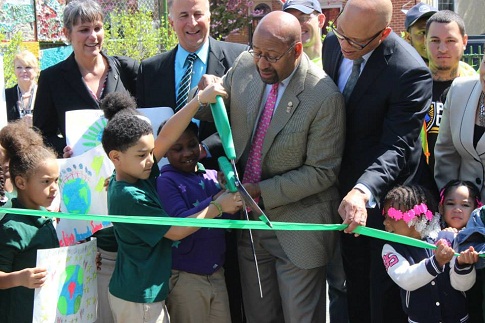Save the Date: Join us on Monday, May 4 for a very special presentation and discussion.

Mayor Nutter and Dr. Hite join George W. Nebinger students in a ribbon cutting for their green schoolyard on Earth Day 2015.
After years of bringing the benefits of green stormwater features to dozens of Philly schools through our Green City, Clean Waters plan, we’re ready to share what we’ve learned with communities here and around the country. The result? Transforming Philadelphia’s Schoolyards, a colorful, 44-page design guide to greening schoolyards made with the help of the Community Design Collaborative and their ace team of volunteers.
The pioneering toolkit on schoolyard transformation will be presented on Monday, May 4, 2015 from 5:30 pm to 7:30 pm at the Center for Architecture, 1216 Arch Street. The event will include a panel discussion featuring the leaders of three successful schoolyard makeovers, a green schoolyards resource fair, and opening remarks by Philadelphia School District Superintendent, William R. Hite. Jr. and PWD's Commissioner, Howard Neukrug. And, yes, you ARE invited!
We made this guide because there’s an ever-growing groundswell of communities seeking to reinvent Philadelphia’s mostly asphalt schoolyards as neighborhood spaces that foster learning, connection to nature and community. Transforming Philadelphia’s Schoolyards presents ideas, advice and stories drawn from PWD and the Collaborative’s work to design green schoolyards and manage stormwater—providing on-the-ground experience, case studies and guidance for motivated schools and communities across the city and country to do the same.
Through the Green City, Clean Waters plan, PWD is reimagining stormwater management citywide and sees schoolyards as ideal sites for green infrastructure. When PWD began working with the School District of Philadelphia, it recognized a need for a holistic approach to reinventing the schoolyard, and teamed up with the Collaborative, a non-profit providing preliminary architectural, landscape architectural, and engineering designs that incorporate the voices of schools, neighbors and communities. Having been with us since Green City, Clean Waters started nearly five years ago, the Collaborative's experience made them the perfect partner for this guide.
Advocates for green schoolyards (including teachers, administrators, students, families, communities, designers, public agencies, and others) will gain inspiration and receive a complimentary copy of the design guide at the event.
You can RSVP for the event here. If you’re interested in making your community’s school a greener, brighter place, we hope to see you there!